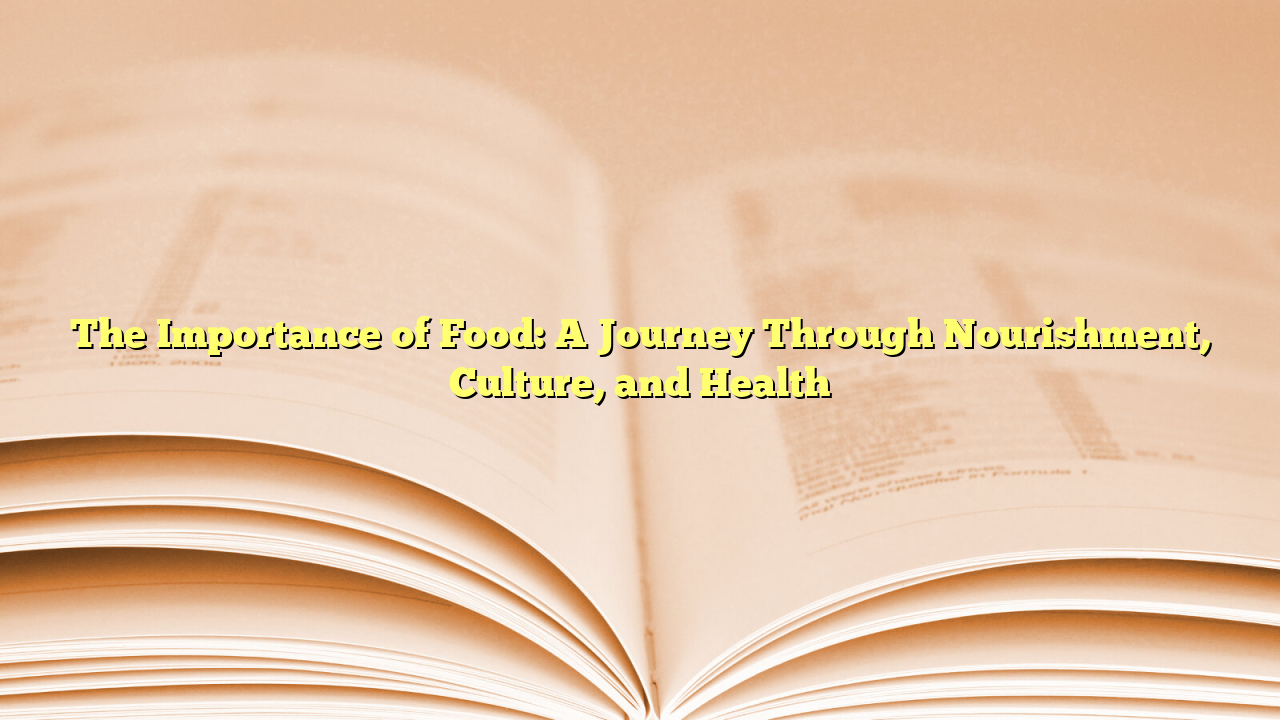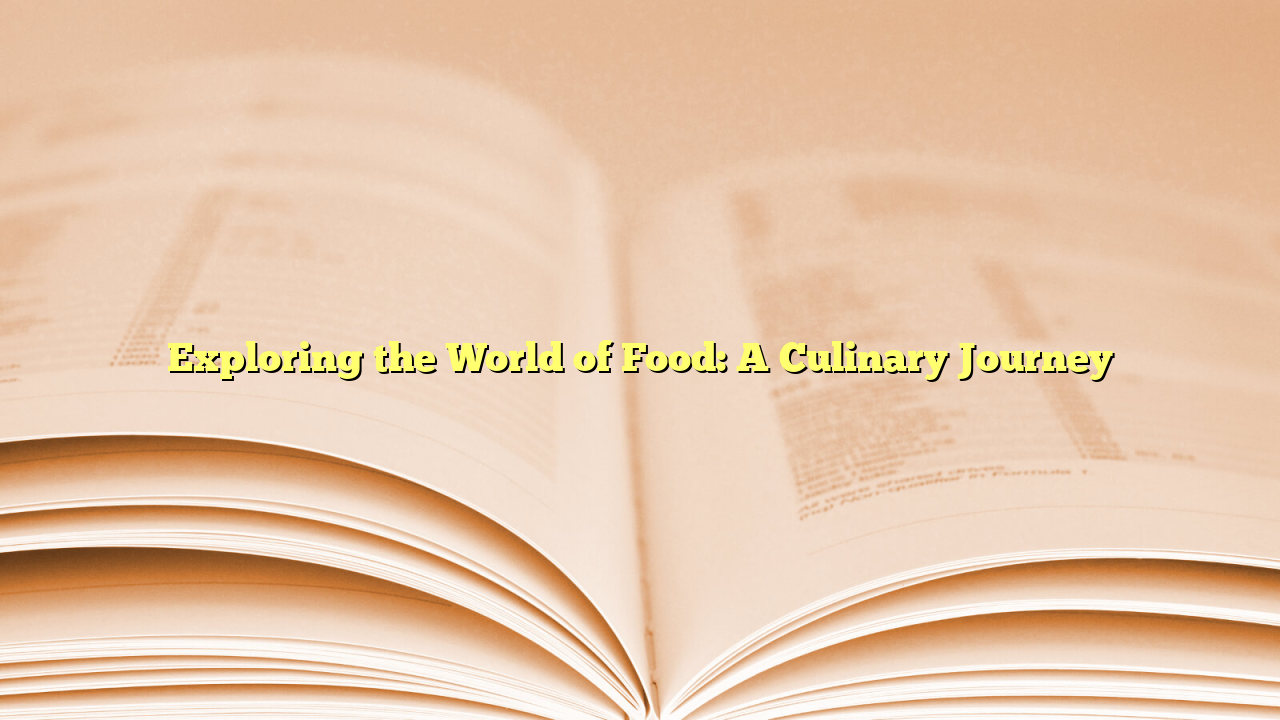Food is an essential part of human life. It not only provides the nutrients necessary for
growth and survival but also serves as a source of comfort, social bonding, and cultural
identity. From the simple, nutritious meals we consume daily to the complex and flavorful
dishes enjoyed in restaurants, food plays a central role in shaping our lives. This article
explores the importance of food from three perspectives: its nutritional value, its role in
culture, and its impact on health.
Nutritional Value: The Foundation of Well-Being
At its core, food is the source of energy and nutrients that our bodies need to function
properly. The six essential nutrients—carbohydrates, proteins, fats, vitamins, minerals, and
water—are all found in varying degrees in the foods we eat. Each of these nutrients plays a
specific role in maintaining bodily functions.
Carbohydrates are the body’s primary source of energy. Found in foods like grains, fruits,
and vegetables, carbohydrates are broken down into glucose, which fuels the brain,
muscles, and other tissues.
Proteins are crucial for the growth and repair of tissues. Meat, fish, eggs, beans, and nuts
are excellent sources of protein.
Fats provide long-term energy and are vital for the absorption of fat-soluble vitamins like A,
D, E, and K. Healthy fats, such as those found in avocados, olive oil, and nuts, are essential
for overall health.
Vitamins and minerals support various functions in the body, including immune function,
bone health, and nerve function. Foods rich in vitamins and minerals include fruits,
vegetables, dairy products, and whole grains.
Water is perhaps the most overlooked nutrient, yet it is essential for every cell in the body. It
aids digestion, regulates body temperature, and supports cellular functions.
Maintaining dewaslot69 link balanced diet, rich in these nutrients, is vital for overall health. However, many
people face challenges in accessing the right foods, particularly in areas with limited
resources or where unhealthy, processed foods are more readily available. This is why food
education and access to nutritious meals are so important for public health.
Cultural Significance of Food: A Connection to Heritage
Food is more than just fuel for the body—it is deeply intertwined with cultural identity and
social traditions. Every culture has its own distinct cuisine, which reflects the history,
geography, and values of that society. Food traditions are passed down through generations,
creating a sense of connection and belonging.
For example, in Italy, meals are often a time for family gatherings, with pasta, pizza, and
olive oil serving as staples. In Japan, rice, seafood, and vegetables play a central role in
their culinary practices. In Mexico, the combination of maize, beans, and chili peppers is
essential to many dishes, such as tacos and tamales.
Food is also a symbol of celebration and ritual. Special dishes are often prepared for
holidays, festivals, and religious ceremonies. In many cultures, sharing a meal is a way of
showing hospitality, love, and respect. Whether it’s a Thanksgiving dinner in the United
States, a Lunar New Year feast in China, or an Eid meal in Muslim communities, food serves
as a focal point for coming together and marking important occasions.
Moreover, food plays a role in storytelling and preserving history. Traditional recipes often
contain elements that date back centuries and carry with them tales of migration, trade, and
survival. For example, the spread of spices like cinnamon, nutmeg, and pepper is a
reflection of global exploration and trade routes that shaped the world.
Food is a universal language that transcends geographical and linguistic boundaries.
Through the exchange of culinary traditions, people from different parts of the world can
connect and share experiences, further strengthening the ties between diverse cultures.
The Impact of Food on Health: The Good, the Bad, and the Balanced
While food is essential for health, not all food choices are created equal. The modern food
environment, which often includes highly processed, sugary, and fatty foods, has led to rising
rates of chronic diseases like obesity, diabetes, heart disease, and hypertension. These
conditions are largely preventable through diet and lifestyle changes, yet they continue to be
significant global health challenges.
The growing availability of fast food and processed snacks has contributed to an increase in
unhealthy eating habits. These foods are often high in calories, low in essential nutrients,
and contain additives and preservatives that may harm the body in the long run. For
example, consuming excessive amounts of refined sugar can lead to insulin resistance and
diabetes, while trans fats in processed foods can increase the risk of cardiovascular disease.
However, the right types of food can also promote optimal health. A diet rich in whole,
unprocessed foods, such as fruits, vegetables, whole grains, and lean proteins, can reduce
the risk of many chronic diseases. Eating a variety of colorful foods ensures that the body
receives a wide range of nutrients, including antioxidants that protect against oxidative stress
and inflammation.
Moreover, food plays a role in mental health. Studies have shown that a well-balanced diet
can improve mood, cognitive function, and even reduce symptoms of depression and
anxiety. Nutrients like omega-3 fatty acids, found in fish, and B vitamins, found in whole
grains, are particularly important for brain health.
In recent years, there has been a growing movement towards sustainable and ethical eating
practices. People are becoming more conscious of the environmental impact of their food
choices and are opting for locally sourced, organic, and plant-based foods. This shift not only
benefits personal health but also supports the well-being of the planet.
Conclusion
Food is a powerful force that shapes our lives in numerous ways. It nourishes our bodies,
connects us to our cultural heritage, and has a profound impact on our health. While the food
choices we make can significantly influence our well-being, food also serves as a reminder
of the importance of balance, variety, and sustainability in our diets. By embracing a healthy
and mindful approach to food, we can enhance our quality of life and contribute to a
healthier, more interconnected world.
The Importance of Food: A Journey Through Nourishment, Culture, and Health



